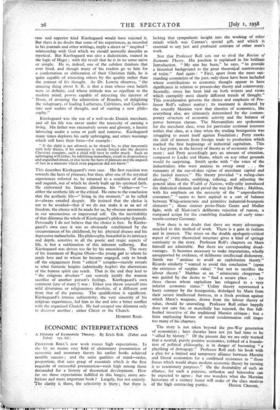EITHER-OR
THOUGH it has been delayed for so long, the introduction of Kierkegaard to the English-speaking world is now well under way—this is the fourth study of his life or philosophy to appear within a space of three years. It is by far the most voluminous and thorough. Dr. Lowrie apologises for having had to cut his manuscript by 8o,000 words, but we are still left with a substantial book of more than six hundred pages. A considerable proportion of these consist of quotations translated direct from the Danish, and made necessary by the absence of any English edition of Kierkegaard's works. The result is that we have not merely a genial biography and learned study of the great Danish mystic, but also an anthology of extracts from his writings extensive enough to enable the reader, who cannot read Kierkegaard in the original or in the existing German translations, to obtain a very fair impression of the range and depth of his thought.
I have called Kierkegaard a mystic, but that is one of the points in dispute. In so far as the word implies a being of a
-rare- and superior kind Kierkegaard would have rejected it. But there is no doubt that some of his experiences, as recorded in his journals and other writings, imply a direct or " inspired " relationship with God which we should normally describe as mystical. But Kierkegaard was also a dialectician, trained in the logic of Hegel; with the result that he is in no sense naive or simple. He is, indeed; one of the subtlest thinkers that ever lived, and though many of his readers go to him for a confirmation or elaboration of their Christian faith, he is quite capable of attracting others by the quality rather than the content of his thought. As Dr. Lowrie observes, " the amazing thing about S. K. is that a man whose own beliefs
were so definite, and whose attitude was so repellent to the modern mind, proves capable of attracting the interest of Ibsen, of arousing the admiration of Brandes, of delighting the voluptuary, of leading Lutherans, Calvinists, and Catholics into new realms of thought, and of starting a new philo- sophy."
Kierkegaard was the son of a well-to-do Danish merchant, and all his life was never under the necessity of earning a living. His father was excessively severe and gloomy, a fanatic labouring under a sense or guilt and remorse. Kierkegaard many times deplores his early upbringing, and utters warnings which still have their force—for example :
" If the child is not allowed, as he should be, to play innocently with holy things, if his existence is sternly forced into the decisive Christian concepts, such a child will have to suffer much. Such an upbringing will either, by inhibiting immediacy, result in despondency and anguished dread, or else incite the lusts of pleasure and the anguish of lust in a measure which even paganism did not know."
This describes Kierkegaard's own case. His first reaction was towards the lusts of pleasure, but then, after one of the mystical experiences referred to, he returned to a condition of dread and anguish, out of which he slowly built up his spiritual faith. He elaborated his famous dilemma, his " either—or "- either the aesthetic life or the ethical. He came to the conclusion that the aesthetic life—" living in the moment," as he called it—always entailed despair. He insisted that the choice is not to be avoided—that if we do not make it as an act of freedom, the choice will be made for us, by obscure movements in our unconscious or impersonal self. On the inevitability of that dilemma the whole of Kierkegaard's philosophy depends. Personally I do not believe that the choice is free. In Kierke- gaard's own case it was so obviously conditioned by the circumstances of his childhood, by his physical disease and his depressive melancholia. His philosophy, beautiful in its intricacy and depth, sensitive to all the poetic and tragic aspects of life, is but a sublimation of this inherent suffering. But Kierkegaard was driven too far by his masochism. The story of his treatment of Regina Olsen—the young 01 to whom he made love and to whom he became engaged, only to 'break off the engagement from " ethical " scruples—merely reveals to what fantastic heights (admittedly heights) the aberrations of the human spirit can reach. That in the end they lead to " the religious absolute " can scarcely justify the wanton sacrifice of another person's feelings. Kierkegaard's own comment (one of many !) was : Either you throw yourself into wild diversions or religiousness absolute, of a different sort from that of the parsons. The qualification is significant. Kierkegaard's intense subjectivity, the very sincerity of his religious experiences, led him in the end into a bitter conflict with the organised Church. He had escaped one dilemma only to discover another : either Christ or the Church.
HERBERT READ.



















































 Previous page
Previous page